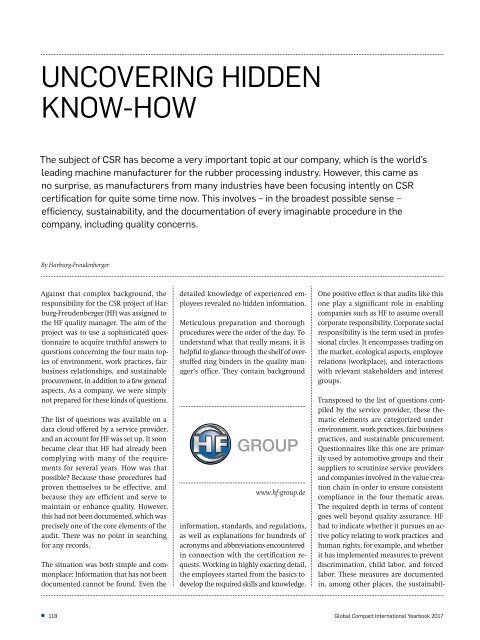Global Compact International Yearbook 2017
Sustainability in Troubled Times We life in times of uncertainty and global (dis)Order. „Understanding global mega-trends is crucial. We live in times of multiple, evolving and mutually-reinforcing shifts“, says UN Secretary-General António Guterres. He adds: „These dynamics, of geopolitical, demographic, climatic, technological, social and economic nature, enhance threats and opportunities on an unprecedented scale.“ Therefore sustainability in troubled times is the key topic of the Global Compact International Yearbook 2017, edited by macondo publishing.
Sustainability in Troubled Times
We life in times of uncertainty and global (dis)Order. „Understanding global mega-trends is crucial. We live in times of multiple, evolving and mutually-reinforcing shifts“, says UN Secretary-General António Guterres. He adds: „These dynamics, of geopolitical, demographic, climatic, technological, social and economic nature, enhance threats and opportunities on an unprecedented scale.“ Therefore
sustainability in troubled times is the key topic of the Global Compact International Yearbook 2017, edited by macondo publishing.
Create successful ePaper yourself
Turn your PDF publications into a flip-book with our unique Google optimized e-Paper software.
UNCOVERING HIDDEN<br />
KNOW-HOW<br />
The subject of CSR has become a very important topic at our company, which is the world’s<br />
leading machine manufacturer for the rubber processing industry. However, this came as<br />
no surprise, as manufacturers from many industries have been focusing intently on CSR<br />
certification for quite some time now. This involves – in the broadest possible sense –<br />
efficiency, sustainability, and the documentation of every imaginable procedure in the<br />
company, including quality concerns.<br />
By Harburg-Freudenberger<br />
Against that complex background, the<br />
responsibility for the CSR project of Harburg-Freudenberger<br />
(HF) was assigned to<br />
the HF quality manager. The aim of the<br />
project was to use a sophisticated questionnaire<br />
to acquire truthful answers to<br />
questions concerning the four main topics<br />
of environment, work practices, fair<br />
business relationships, and sustainable<br />
procurement, in addition to a few general<br />
aspects. As a company, we were simply<br />
not prepared for these kinds of questions.<br />
The list of questions was available on a<br />
data cloud offered by a service provider,<br />
and an account for HF was set up. It soon<br />
became clear that HF had already been<br />
complying with many of the requirements<br />
for several years. How was that<br />
possible? Because those procedures had<br />
proven themselves to be effective, and<br />
because they are efficient and serve to<br />
maintain or enhance quality. However,<br />
this had not been documented, which was<br />
precisely one of the core elements of the<br />
audit. There was no point in searching<br />
for any records.<br />
The situation was both simple and commonplace:<br />
Information that has not been<br />
documented cannot be found. Even the<br />
detailed knowledge of experienced employees<br />
revealed no hidden information.<br />
Meticulous preparation and thorough<br />
procedures were the order of the day. To<br />
understand what that really means, it is<br />
helpful to glance through the shelf of overstuffed<br />
ring binders in the quality manager’s<br />
office. They contain background<br />
www.hf-group.de<br />
information, standards, and regulations,<br />
as well as explanations for hundreds of<br />
acronyms and abbreviations encountered<br />
in connection with the certification requests.<br />
Working in highly exacting detail,<br />
the employees started from the basics to<br />
develop the required skills and knowledge.<br />
One positive effect is that audits like this<br />
one play a significant role in enabling<br />
companies such as HF to assume overall<br />
corporate responsibility. Corporate social<br />
responsibility is the term used in professional<br />
circles. It encompasses trading on<br />
the market, ecological aspects, employee<br />
relations (workplace), and interactions<br />
with relevant stakeholders and interest<br />
groups.<br />
Transposed to the list of questions compiled<br />
by the service provider, these thematic<br />
elements are categorized under<br />
environment, work practices, fair business<br />
practices, and sustainable procurement.<br />
Questionnaires like this one are primarily<br />
used by automotive groups and their<br />
suppliers to scrutinize service providers<br />
and companies involved in the value creation<br />
chain in order to ensure consistent<br />
compliance in the four thematic areas.<br />
The required depth in terms of content<br />
goes well beyond quality assurance. HF<br />
had to indicate whether it pursues an active<br />
policy relating to work practices and<br />
human rights, for example, and whether<br />
it has implemented measures to prevent<br />
discrimination, child labor, and forced<br />
labor. These measures are documented<br />
in, among other places, the sustainabil-<br />
118<br />
<strong>Global</strong> <strong>Compact</strong> <strong>International</strong> <strong>Yearbook</strong> <strong>2017</strong>

















